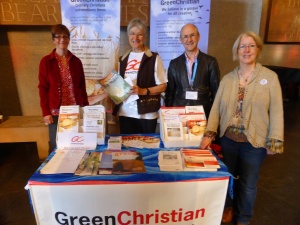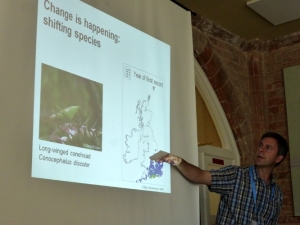Reconciling a wounded planet – Coventry Cathedral

Judith Allinson gives her view of the Conference at Coventry 18-19 Sept 2015:
(This post may be expanded later) Tweet hash-tag: #woundedplanet
Introduction
Over 150 people converged on Coventry Cathedral for the two day conference, about care of the environment and Christianity. “Reconciling a wounded planet”
Clare Redfern (GC magazine’s co-editor) set up the Green Christian stand, and I helped. At least 15 GC members were there plus several people who receive our GC news e-mail… even more, now that many people signed up for it.
Thus there are least 150 different views of the conference. May we all take inspiration to our homes and congregations, and use what we have learned
Reconciliation is the topic for several texts in the bible ( dictionary meaning “The restoration of friendly relations”). It’s a term I don’t use in everyday speech with that meaning – so it was fascinating to see how the term was used and developed in various ways as a focus for our thoughts on Caring for God’s Creation. I’ll mention some of these later in this post.
Caring for God’s creation is a vital topic as humankind’s population increases and our individual impact on the environment increases so that we are making the world a poorer, more unstable place – not just for our neighbours of future generations.. but for our own generation.
(Plastic residues in the sea: acidification of the sea; halving of the vertebrate fish in the sea over the last 50 years; world soil loss; loss of biodiversity and mass extinctions; nitrogen oxides pollution; and melting of the ice and climate change. Just by travelling to this conference the majority of us would have exceeded our “fair share of daily sustainable energy use with respect to CO2 production“)
Three separate sessions of work in small groups gave excellent opportunity for networking. A big thank you too to the Cathedral volunteers who helped in the preparation and on the day.
There is a “Community of the Cross of Nails” at Coventry Cathedral about Reconciliantion and there are now 170 associated communities. 40 years ago one of these held a conference about care of the environment in Tennessee. One of the people at that conference , Kenyon Wright from Edinburgh attended our conference too.
————————-
First Morning – 18 September
The key speakers would give inspiring talks during the conference: Bishop James Jones, Prof Richard Bauckham and Prof Ghillean Prance (former director of Kew Gardens and then the Eden Centre).
First, Revd Margot Hodson gave a worshipful introduction (see 2 videos below)
Margot Hodson -“Christ died to reconcile all things” (Colossians 1 v20)- a 1 min snippet from the conference and see also
“We are the body of Christ so we feel the pain of all creation” – a more detailed explanation -(3min 10 sec)
Sir Ghillean Prance gave us stories of hope.
He described the boat journey in the Amazon organised by The Patriarch of the Orthodox Church – with 50 scientists, 50 theologians, 50 journalists.. – Bishop James Jones was there too. (The Pope in Note 8 and 9 of his encyclical describes Patriarch Bartholomew) . Prance said that later Brazil made laws relating to not cutting down rainforest for soya.
————————-
He described how the Aymara Indians had a traditional system involving letting some land lie fallow: The government forced them to cultivate all the land the total agricultural productivity went down.!! A consortium of Missionaries working there saw what was happening and persuaded the government to allow them to continue havin a period of allowing the land to be fallow.
He reminded us of Exodus chapter 23: v 10-11: 10 “For six years you are to sow your fields and harvest the crops, 11 but during the seventh year let the land lie unplowed and unused. Then the poor among your people may get food from it, and the wild animals may eat what is left. Do the same with your vineyard and your olive grove.
We then dispersed into 5 “Streams”. I attended the Enhancing Biodiversity one.and we walked outside up paths, under trees, past squirrels.
There were about 26 of us in an upstairs room of an adjacent building, with the sun streaming through the windows. and a pack of excited schoolchildren outside being given a guided tour. We were chaired by Peter Brotherton, (Head of Biodiversity, Natural England, and Diocesan Environment Officer for Peterborough).. He got us all to introduce ourselves – excellent – if only most meeting did that!! – and it revealed a great variety of back grounds – too many to include in this article.. including two year 8 students from President Kennedy School in Coventry.
Three people gave 10 min talks:
Mike Morecroft showed slides of evidence of climate change and response of species
Bob Sluka reminded us that 70% of our planet’s surface is covered by sea – yet we are causing big changes in the sea. In the last 45 years, half of all vertebrates in the sea have disappeared (due to over-fishing). Pollution, climate change and invasive species play their part too: out of the 17000 species in the Mediterranean Sea, 1000 are introduced, and many invasive.
Where is the hope?
Marine hope spots: Fishing sanctuaries.
The number of eggs laid by fish increase exponentially with size. So if areas are kept with no fishing, then fish get bigger and lay more eggs. some of these fish swim out.. so the number of fish caught in the surrounding area increases. the area can be marked with buoys.
Role of the Christian researcher: Don’t hide your light under a bushel: Show off your beautiful nature – (and he showed us some pretty pictures, )
He explained how lucky we are in the British Isles to have big tides and hence big intertidal zones – so that we can go exploring rock pools when we are young and see what is in them, what lives under the sea. In the Mediterranean people cannot do this. Their tides are very small.
You can read his book Hope for the Ocean and buy it to download
In Kenya there are ” beach boys” who make money by offering to show tourists round/(guard their cars etc says ed.). The Christian charity A Rocha Kenya trains them so that they can give more informative natural history guidance.
The Kenya Wildlife Marine spots are an example of reconciliation –
He encouraged us to write to our MPs to say it is a good idea to make Lyme Bay and Lundi into Marine Reserves. They are trying to get a marine reserve offshore of the Christian Retreat Centre of Lee Abbey.
Brian Cuthbertson told us abut the survey of London churchyards now being undertaken. He said how helpful Ishpi Blatchley had been in surveying lichens. They still need another £60,000 to complete the survey.
There can be reconciliation work to be done sorting peoples conflicting ideas of managing churchyards.
This takes us up to lunch: – so I’ve only covered the first quarter of the conference.!!.
********* I’m going off to watch the lunar eclipse now. (Mon 1.30 a.m. 28 Sep) ********



Leave a Reply